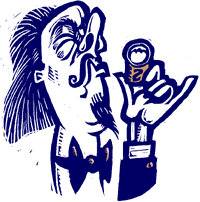
There are two ways to be an achiever. One type of achiever is trying to impress others; the other is simply trying to achieve.
The second type gets more done. Why? Because his focus is exclusively on getting the job done right. It doesn’t occur to him to worry about what others think. If it did, he’d say to himself: “Well, I’ll just get it done right. And then others will be happy.”
Some people achieve so they can make a lot of money. The reason they want money is to impress others. They don’t see themselves as worthy unless others acclaim them, or unless they’re superior to others. Money and property are the only way they know how to measure superiority. This is the definition of snobbery. ‘I have more than you; therefore I’m better.’ The mistaken premise of this attitude is that character is quantitative, rather than qualitative — or relative, rather than objective.
This is one reason wealth producers and acquirers of wealth get a bad name. Some of them are snobs. The reason they’re snobs is they’re trying to feel superior to you, and to throw it in your face. They’re not comfortable with merely achieving, accomplishing and acquiring things for their own pleasure. They must look superior to someone. ‘Oh, you don’t have that kind of car? You live in that neighborhood? How can you stand it?’ They enjoy knowing people to whom they can say these things, because it elevates their own standing, in their own minds.
People like this are called arrogant and selfish. The implication is that they think too much of themselves. But look deeper. If they really thought all that much of themselves, they wouldn’t need to prove it by being superior. They would already know that they’re achievers, and they’d simply enjoy their achievement. They wouldn’t waste time being with people they thought inferior. People with genuine self-esteem don’t waste their time. They only spend time with people they like, respect and admire. Maybe they’ll have friends with more or less material possessions than they have, but they’ll always have friends they enjoy, value and admire. The same applies to marriage.
Achievement and fulfillment of purpose are the meaning of life. Money is not an end in itself. Money is not irrelevant and unimportant. One should not be ashamed because one has money, but one should not consider it — by itself — proof of superiority, either. Also: Many who have money got it through marriage or inheritance, not through their own efforts. Virtue is not bestowed by having money, but through productivity and achievement.
What makes you worthwhile is living a worthwhile life. A worthwhile life IS one of self-fulfillment and personal happiness, but money is not the sole measure of these things. If your life is purposeful and important, then you’ll by definition be able to take care of yourself, since financial independence is a necessary component of happiness.
Maybe you’ll have a lot of money, or maybe you won’t. If you don’t have a sense of purpose, then money won’t give it to you. And if you do have a sense of purpose, then any wealth you acquire will add to the mix, not create all the enjoyment you experience. A happy person is not merely someone with money; a happy person knows how to enjoy any money he has.
People have said that, “Poverty sucks.” This is unquestionably true. It’s better to have more, than less. But what’s also true is that money cannot buy you happiness. What money buys you are choices. It’s better to have choices than not. But just because you have options doesn’t mean you will use them well. You could inherit millions of dollars, and you’d surely be more comfortable than if you inherited nothing. But the presence or absence of that inheritance has nothing to do with whether or not you have a sense of self-esteem, and purpose. The world is full of miserable people with money as well as miserable people who are poor. Money helps, but even great wealth isn’t the whole answer.
There tend to be two attitudes on the subject of money. One is that money is worthless, even bad. The other is that you cannot be anyone or anything without money. The truth is something different. The truth is that leading a meaningful and purposeful life, defined by attainment of rational goals in your career, or elsewhere, is what brings happiness. Money can subsidize your happiness, but it’s never happiness itself.
